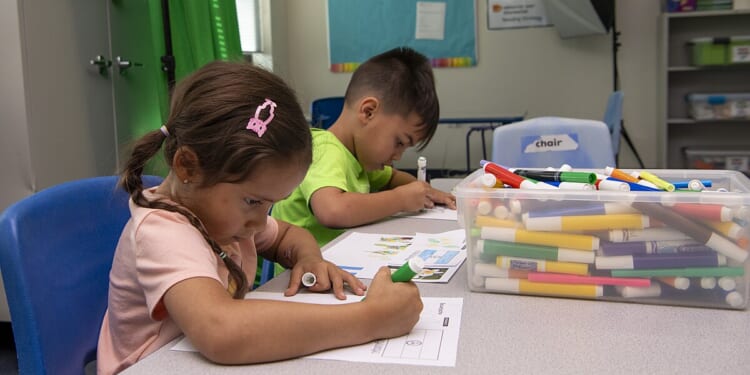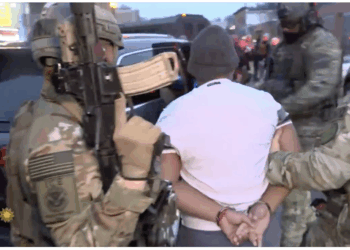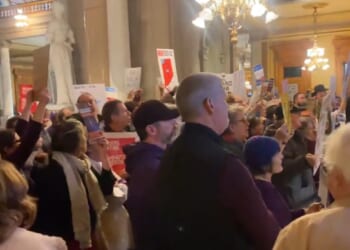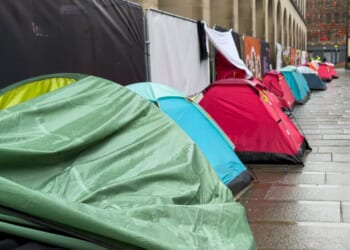The culmination of a disastrous 1982 U.S. Supreme Court decision granting illegal aliens access to American public schools has seemingly taken center stage in Charlotte, North Carolina, this week.
After the Department of Homeland Security revealed Saturday that U.S. immigration officials would be conducting enforcement operations throughout the city, local media began reporting that an unusually high number of students were marked absent from school. According to data in these reports, roughly 30,000 students did not attend Charlotte-Mecklenburg Schools on Monday. (“Officials initially reported that 20,935 students were absent on Monday,” but updated this number, according to WBTV.) The “unofficial” 30,000 figure, if “finalized by the state,” would reportedly be more than double the number of daily absences recorded throughout the previous week.
The vast majority of these reported absences (28,136 out of 30,399) “were listed as unexcused,” according to Queen City News. Further data reported on Wednesday indicates that 25,697 students were also absent from CMS on Tuesday, Nov. 18 — another “unusually high” number, of which 23,770 were unexcused, according to the outlet.
While officials have yet to identify a direct correlation between the absences and ongoing immigration operations, it’s worth noting that a similar dynamic was reported last month in Chicago’s schools after ICE agents launched a sweep of the city. Charlotte-Mecklenburg Schools also boasts a significant number of Hispanic-identifying students (more than 44,000), with 2023 Census Bureau data reportedly showing that 11 percent of North Carolina’s K-12 students have at least one “undocumented” parent.
But regardless of how many of the CMS absences were of an illegal alien or “anchor baby,” the likelihood that a significant portion of the reported figure includes either of those groups reaffirms the damning aftereffects resulting from the Supreme Court’s ill-fated Plyler v. Doe decision. Issued in 1982, the ruling effectively forced open America’s school doors to illegal aliens and their children.
Since the court’s decision, American taxpayers have had to subsidize the education of these individuals. Schools have also had to expend additional resources to grapple with the issue, such as working to accommodate those students who don’t speak English as a primary language.
But there is a bright side to this ongoing problem.
The composition of today’s Supreme Court is very different from the one that decided Plyler. And if Republican state lawmakers play their cards right, they could potentially topple this terrible precedent and return America’s schools to America’s children.
Plyler v. Doe
The case of Plyler v. Doe first came to fruition in the mid-to-late 1970s when Texas enacted a revised law “prohibit[ing] the use of state funds for the education of children who had not been legally admitted to the U.S.,” and permitting districts to “deny enrollment” to such children. The key question before the Supreme Court was whether the statute violated the 14th Amendment’s equal protection clause.
Writing for a 5-4 court, Associate Justice William Brennan ruled that the law was unconstitutional and concluded that “the illegal aliens who are plaintiffs in these cases may claim the benefit of the Fourteenth Amendment’s guarantee of equal protection.”
“At the least, those who elect to enter our territory by stealth and in violation of our law should be prepared to bear the consequences, including, but not limited to, deportation. But the children of those illegal entrants are not comparably situated,” Brennan wrote. “Their ‘parents have the ability to conform their conduct to societal norms,’ and presumably the ability to remove themselves from the State’s jurisdiction; but the children who are plaintiffs in these cases ‘can affect neither their parents’ conduct nor their own status.’ … Even if the State found it expedient to control the conduct of adults by acting against their children, legislation directing the onus of a parent’s misconduct against his children does not comport with fundamental conceptions of justice.”
Writing for the dissent, Chief Justice Warren Burger blasted the majority for “trespass[ing] on the assigned function of the political branches” and “assum[ing] a policymaking role” by unilaterally opening up American schools to illegal aliens. The majority, the chief justice noted, “makes no attempt to disguise that it is acting to make up for Congress’ lack of ‘effective leadership’ in dealing with the serious national problems caused by the influx of uncountable millions of illegal aliens across our borders.”
“The Court’s holding today manifests the justly criticized judicial tendency to attempt speedy and wholesale formulation of ‘remedies’ for the failures — or simply the laggard pace — of the political processes of our system of government,” Burger wrote. “The Court employs, and, in my view, abuses, the Fourteenth Amendment in an effort to become an omnipotent and omniscient problem solver. That the motives for doing so are noble and compassionate does not alter the fact that the Court distorts our constitutional function to make amends for the defaults of others.”
The Game Plan
Unlike the other two branches, the judiciary is primarily a reactive institution. That means that in order for SCOTUS to potentially reconsider Plyler, there need to be legal cases that can make their way to its bench.
One way to do this is for Republican-controlled states across the country to pass laws that cut off illegal aliens’ access to U.S. public schools. A pair of (fairly weak) bills seeking to advance such policy were introduced in Tennessee earlier this year, but the GOP-controlled legislature ended its session before they could be passed and sent to the governor’s desk.
These types of laws will undoubtedly draw lawsuits from left-wing litigants and organizations seeking to keep forcing states to admit illegal aliens to their public schools. In turn, these lawsuits will prompt legal proceedings and lower court rulings that can ultimately be appealed to the Supreme Court.
While it’s unclear if the justices would take up the case, and if they did, what a potential ruling would look like, it’s worth noting that the current court is jurisprudentially superior to the 1982 roster that decided Plyler. Unlike prior Supreme Courts’ embrace of living constitutionalism and judicial activism, a majority of the current justices have largely demonstrated a willingness to adhere to originalist doctrine and roll back bad precedent in a number of key areas (abortion, administrative law, transgenderism, etc.).
The only chance that horrific SCOTUS decisions like Plyler have at getting overturned is if red states get off the sidelines and pass laws that challenge its validity. Until they do, the status quo of American taxpayer-funded schools being overrun with the children of illegal aliens will continue to be a reality.
Shawn Fleetwood is a staff writer for The Federalist and a graduate of the University of Mary Washington. He previously served as a state content writer for Convention of States Action and his work has been featured in numerous outlets, including RealClearPolitics, RealClearHealth, and Conservative Review. Follow him on Twitter @ShawnFleetwood

















